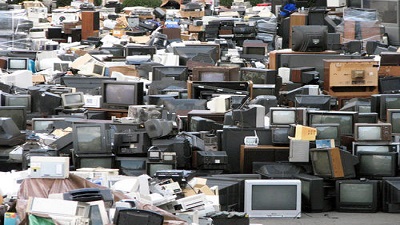Category : E - Waste | Location : Karnataka | Posted on 2022-07-08 01:09:52

Bengaluru: With technology becoming an integral part of education, e-waste is emerging as a mounting problem for several schools.
According to the department of public instruction, there are around 1,387 tonnes of e-waste lying in 5,000 schools. The department of state education research and training has decided to call tenders for disposing of this waste. The highest bidder will get the waste which are mostly desktops, projectors and lead acid batteries.
Since the department introduced computer education in 2000-01, many of its schools were equipped with computers, thin clients, UPS systems with lead acid batteries, projectors, printers/multi function devices, modems, etc for technology assisted learning.
“Most of the equipment that was supplied before 2010-11 are old enough and not in working condition. They could not be repaired as technology has advanced and spares for them are not available. In addition to IT and electronic equipment supplied by the government under various schemes, many of the IT companies/corporates/NGOs have also donated new and used computers to various schools of which many are not in working condition,” said a tender notification from the department.
Additionally, offices of the public instruction department also stock several equipment that are not in working condition at various levels. DSERT has called for tenders to dispose of the obsolete ones following procedures laid down by the Karnataka Pollution Control Board. As per data, there are 28,539 units of lead acid batteries, 14,000 desktops and monitors, 17,391 power and data cables and 11,000 keyboards. There are also 10,000 units of mics, sound boxes and horns for disposal. Around 2,600 TVs and 8,900 radios and tape recorders are also part of the list that has to be disposed of.
The bidder has to collect the waste from each school located in 204 blocks and discard them. However, experts said this will create a huge logistics issue.
“To go to every school across the state to collect waste is not a viable option as the vendor has to reach out to 5,000 sources and transport it. Instead, the department should suggest that schools should drop off the e-waste at a common point like the block/district education office in the area so that it would limit the number of places from where the vendor can collect it from,” said Rajesh Babu, co-founder, Swaccha eco-solutions.
“Aggregating, segregating and recycling waste is the best way to deal with e-waste. If the government is making money doing this, it is a good practice that can be emulated,” said V Ramaprasad, solid waste management expert.
Source: https://timesofindia.indiatimes.com/city/bengaluru/1387-tonnes-of-e-waste-piles-up-in-5000-schools-across-karnataka/articleshowprint/92737152.cms